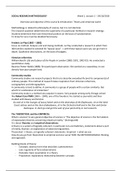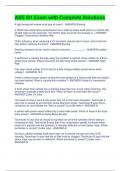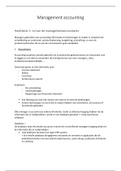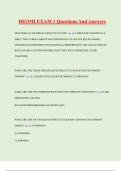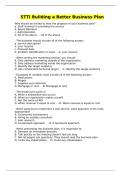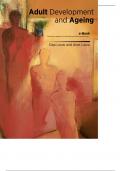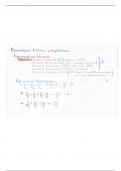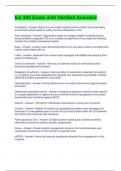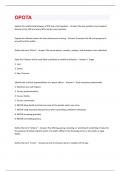Overview and objective of the course & Introduction: Theory and empirical world
Methodology is related to philosophy of science, but it is not identical.
The research question determines the superiority of a particular method or research strategy.
Students determine their own theoretical position on the basis of substantiation.
To know for sure must be doubted ferociously.
Frederic Le Play (1805 – 1882)
Focus on method. Analysis unit and mixing methods. Le Play conducted a research in which from
300 families studied he selected 36 “typical cases” -> with these typical cases you can go more in
depth. Qualitative descriptions, on the basis of budgets.
Victorian reformists
William Booth: Life and Labour of the People in London (1889, 1891, 1902-03). He conducted a
quantitative study.
Beatrice Potter-Webb (1888): first participant observation. She worked at a sweatshop, to see
directly how poor people lived.
Community studies
Community studies are research projects that try to describe everyday life (and its components) of
ordinary people. This method of research takes inspiration from Victorian reformists,
sociographers and ethnographers.
A community is hard to define. A community is a group of people with a certain similarity. But
which? A combination of similarities?
Community study is a method very popular in waves. Very popular among early Chicago school
like Robert Ezra PARK (1864 – 1944), one of the founders. He started as journalist and then
studied with Dewey and Simmel.
Go and sit in the lounges of luxury hotels and on the doorsteps of the flophouses; sit on the Gold
Coast settees and on the slum shakedowns; sit in the Orchestra Hall and in the Star and Garter
Burlesque. In short go and get the seat of your pants dirty in real research.
The THEORETICAL and the EMPIRICAL
What is science? A very general objective of science is “The objective of science is the formulation
of explanatory theories concerning empirical reality.” (Koningsveld)
It is about theories and empirical observations.
A theory is a system of logically coherent, in particular non-contradictory, statements about a part
of reality. Bryman: an explanation of observed regularities.
Theoretical -> theory, so logically coherent statements. Empirical -> what we see
How do you go from theoretical to empirical and vice versa? With the METHODOLOGICAL thinking
and approach.
Building blocks of theory:
- Concepts: abstract term that describes a phenomenon
- Law: regularity of facts (observations)
- Postulate: basic assumption in a theory
- Proposition: explanatory relationship between concepts
,Robert K.MERTON made a distinction between types of use of theories:
• Grand theories: abstract, very large scope
• Middle range theories: useful for empirical research, limited scope. Like the reference
group theory
• Background literature: focused research for theories, empirical research, limited scope
• Fact collection: hardly any theory, ad-hoc selection
Theorizing: INDUCTION and DEDUCTION
Induction is when you reason from the empirical to the theoretical. The form of reasoning, in
which from a limited number of observations a universal statement is made about all cases.
Verification logic: A1 has property P
A2 has property P
A3 has property P …
---------------------------------
All A have property P
Deduction is when you reason from the theoretical to the empirical. The form of reasoning, in
which from general statements predictions about observations are made.
Falsification logic: All A have property P
K is an A
---------------------------------
K has property P
Inductive Empirical Cycle
You start with a problem. Observations before theory. And then you make an evaluation.
The problem with induction is generalization. How many observations are needed to arrive at a
valid general statement?
Karl Popper suggested two ‘solutions’: Use falsification logic because falsification is stronger than
verification; use probability and statistics.
Induction =/= tabula rasa
Two main points of criticism of tabula rasa, clean slate:
1. A priori assumptions and selection are necessary because there is too much data
2. Observations are influenced by conscious or unconscious assumptions about certain facts
, Deductive Empirical Cycle
Theory before observations.
‘Complete’ Empirical cycle
Spiraling research approach: pragmatic empirical cycle


